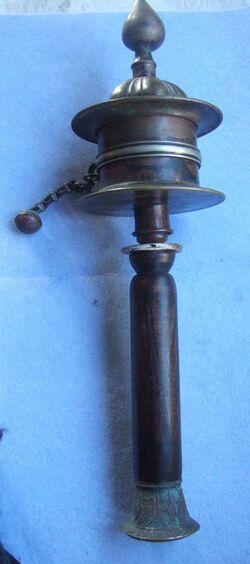Tibetan prayer wheel
Topic: Unsolved
 From HandWiki - Reading time: 2 min
From HandWiki - Reading time: 2 min

Prayer Wheels (Tibetan: mani ´khor lo) are widely used in Tibet and areas where Tibetan culture is predominant.
Hand prayer wheel
The most common form of these objects are hand prayer wheels (Tibetan ma ni lag ´khor ) which consist of a metal cylinder and a handle which also serves as axis around which the cylinder can revolve, being set in motion by a small weight which is attached to it by a string or chain. The cylinder contains a paper roll on which Buddhist texts are printed. When the prayer wheel is spun in prayer, the mantras inside become potent with the person's intent.
Other forms of prayer wheels
Apart from hand prayer wheels there exist large size fixed prayer wheels which are often aligned around Buddhist shrines and are set in motion by pilgrims who circum-ambulate the building in a clockwise direction. Prayer wheels larger than human size are to be seen in separate rooms in Tibetan Buddhist temples and can also be set in motion by pilgrims. With the help of a small bell the number of revolutions can be counted. The cylinders of fixed prayer wheels are often inscribed with the formula “Om mani padme hum” (meaning “jewel in the lotus”) in ornamental Lantsa (Ranjana) letters. Prayer wheels (perhaps more accurately called “mantra mills”) can also be set in motion by wind or water power; they are used particularly during Tibetan festivals.
Origin of prayer wheels
Some experts[who?] believe that the prayer wheels evolved from revolving octagonal Chinese bookcases which were first recorded in the 9th century CE. This assumption is supported by the existence of octagonal prayer wheels in Mongolia.
See also
References
- Goodrich, L. Carrington: “The Revolving Book-Case in China”. Harvard Journal of Asiatic Studies, vol. 7, Cambridge, Mass., 1942-43, p. 130-161.
- Hunter, Alwin: "Tibetan Prayer Wheels". Arts of Asia, vol. 15, no. 1 (January/February 1985), p. 74-81.
- Martin, Dan: “On the Origin and Significance of the Prayer Wheel According to two Nineteenth-Century Tibetan Literary Sources”. Journal of the Tibet Society, vol. 7, Indiana University, 1987
- Simpson, William: The Buddhist Praying Wheel, London, 1896
 KSF
KSF